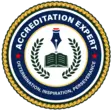Each institution must have a vision with a strategy; a Vision without a Strategy remains an illusion.
One of the critical steps in any institution’s accreditation path is the Self-evaluation (Self-Study).
Self-evaluation (Self-Study) is not a one-time event but a continuous, integrated process. It requires institutions to engage with all aspects of the standards continuously.

This process serves two primary purposes: first, it offers the institution a chance to critically examine its operations, processes, and procedures regularly for ongoing improvement. Second, it equips the on-site review team with a thorough overview of the institution, including its mission and the processes crucial for delivering quality higher education.
The Self-Evaluation Report (Self-Study Report) is the institution’s narrative, starting from its origins and mission and then detailing its growth and future aspirations. This is an opportunity for institutions to showcase their dedication to student service and commitment to providing higher education pathways that will influence future generations. Institutions articulate their journey through the Self-Evaluation Report (Self-Study Report) template, ensuring their policies and procedures align with the accreditation standards. This step is instrumental in demonstrating an institution’s commitment to excellence and ongoing efforts to meet and exceed accreditation standards.
Here is our approach to guiding institutions in putting together a comprehensive Self-Evaluation Report (Self-Study Report):
- We guide institutions on HOW to connect their policies and procedures with every accreditation standard, core component, and sub-component to ensure the report is straightforward and prevents misunderstanding. Our Expert teaches you why detailed descriptions of processes or procedures are crucial and how to allow institutions to spotlight their operational practices.
- Our detailed method demonstrates how to thoroughly assess an institution’s strengths, weaknesses, opportunities, and threats, emphasizing the positive aspects while identifying and tackling areas needing enhancement.
- Since accreditation aims to provide a structured way to demonstrate educational quality through peer review, there’s always a chance for enhancement. Institutions should embrace external feedback, being honest, accurate, and transparent.
The pursuit of accreditation is a collaborative effort across the institution. It necessitates institution-wide participation throughout the self-evaluation. This involves thoroughly examining how the institution delivers quality higher education aligned with its mission and student demographic. Writing, editing, and formatting a detailed Self-Evaluation Report takes considerable effort and should not be underestimated. Institutions should allocate adequate time to produce a report that accurately represents them and shows compliance with accreditation standards.
When submitting the Self-Evaluation Report and associated exhibits, institutions must follow the standards and incorporate necessary documents as specified in the accreditation guidelines. Our team is here to assist you throughout the process, showing you the guidelines and how to include the appropriate exhibits.




